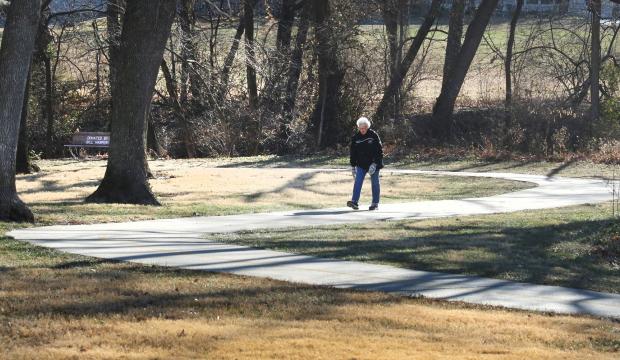
Local infrastructure can encourage healthy decisions
The environment people live in has a big influence on how healthy they are.
That doesn’t mean failed New Year’s resolutions can be blamed entirely on surroundings — a healthy lifestyle is still largely determined by individual choices — but infrastructure and community initiatives can go a long way in encouraging residents to make healthier, more responsible decisions.
Shawnee County is on the path to making this a reality for its residents, thanks to a variety of planned additions to trails and walkways.
“Our 10-year master plan is to have 150 miles of trails in the county,” said Mike McLaughlin, communications and public information supervisor for Shawnee County Parks and Recreation. “We currently have just over 54 miles. An important element of the trails is connectivity. If we can get the current trails to connect to one another, it encourages more use, and people can use them to get to more places for more reasons.”
The Kansas Department of Transportation recently provided a grant to extend the Deer Creek Trail from S.E. 10th Street through Dornwood Park to S.E. 25th Street. McLaughlin said the hope is to eventually connect it to the Lake Shawnee Trail. That would allow cyclists, or ambitious runners, the ability to start on Shunga Trail at its new S.W. 29th and McClure entry point and travel all the way from southwest Topeka to Lake Shawnee without leaving the trail.
McLaughlin said the deciding factor between whether someone hops in a car or walks or bikes to their destination often comes down to how close a trail is to their residence. That’s just one example of how improved accessibility can enhance a community’s health.
“The best policies are those that make the healthy choice the easy one. That’s not always the case,” said Gianfranco Pezzino, senior fellow and team leader for public health systems and services at the Kansas Health Institute. “If you live, for example, in a place that doesn’t have easy access to affordable fresh food, the easy choice is to go to a convenience store around the corner to buy food less healthy for you.”
For that reason, Pezzino said, the 2016 closure of Dillons at S.W. Huntoon St. and Washburn Ave. is a sore spot for him. While driving an extra two to three miles to another Dillons store may not seem like a burden to some, those without cars are more likely to choose unhealthy options without a grocery store within walking distance.
The issues, though, are challenging. Dan Partridge, director of the Lawrence-Douglas County Health Department, said the Lawrence community has been working on the food desert issue for years, looking particularly at East and North Lawrence areas that don’t have adequate access to food.
“It’s been a long road,” he said. “It’s really about a grocer has to turn a profit. It’s hard to overcome that when the market analysis doesn’t look promising.”
Researchers like Pezzino at the KHI conduct studies that lead to publications created for policymakers, arming them with analysis of the community so they can make informed decisions that affect the health of Kansans.
A 2017 survey by the National Recreation and Park Association showed 85 percent of Americans seek high-quality parks and recreation amenities when choosing a place to live, and 95 percent believe it’s important for their local agency to protect the environment by acquiring and maintaining parks and trails.
“If people live in neighborhoods that have damaged sidewalks or not enough lights, or aren’t near pleasant parks or walkways, they won’t do it,” Pezzino said. “If they don’t have the transportation, they can’t go to places like Lake Shawnee or Gage Park.”
While the thought of trails passing by every neighborhood is nice, reaching the 150-mile total envisioned in the county’s master plan takes funding. McLaughlin said the community’s private companies have helped in that regard.
Blue Cross Blue Shield of Kansas made contributions to fund a fitness loop trail at the Shawnee North Community Center. The health insurance company sees obvious benefits from encouraging physical activity among residents and regularly awards funding to health initiatives in its 103-county service area.
BCBS partners with the Kansas Association for Youth in a “Be the Spark” program that provides grants creating the opportunity for middle school and high school students to be physically active. Another initiative, Pathways to a Healthy Kansas, promotes physical activity, nutrition and tobacco-free environments for 16 communities across the state.
“In my opinion, it makes sense for the industry we’re in to improve the health of the community,” said Marlou Wegener, chief operating officer of the BCBS of Kansas Foundation. “It’s a goal for us to place a strong emphasis on supporting the communities we serve.”
Azura Credit Union made a $180,000 gift for naming rights, trail markers and maps for Azura Trails at Skyline Park. McLaughlin said the 4.7 miles of trails, which cover Burnett’s Mound, wooded areas and prairies, offer the most panoramic views in Shawnee County. Before the signs were installed, most people didn’t even know the trails were there.
If the nearly 100 miles of additions are completed as planned over the next decade, the trails — and the opportunity for a healthier means of transportation — will be hard to miss.
“When thinking about changing behaviors, you need to be physically able to do it, of course, but you also need the opportunity and the motivation to make the change,” Pezzino said. “We need to make sure people have the opportunity to begin with. That alone might not be enough, but without the opportunity, people won’t have what they need to develop healthier behaviors.”
Reporter Morgan Chilson contributed to this story.






